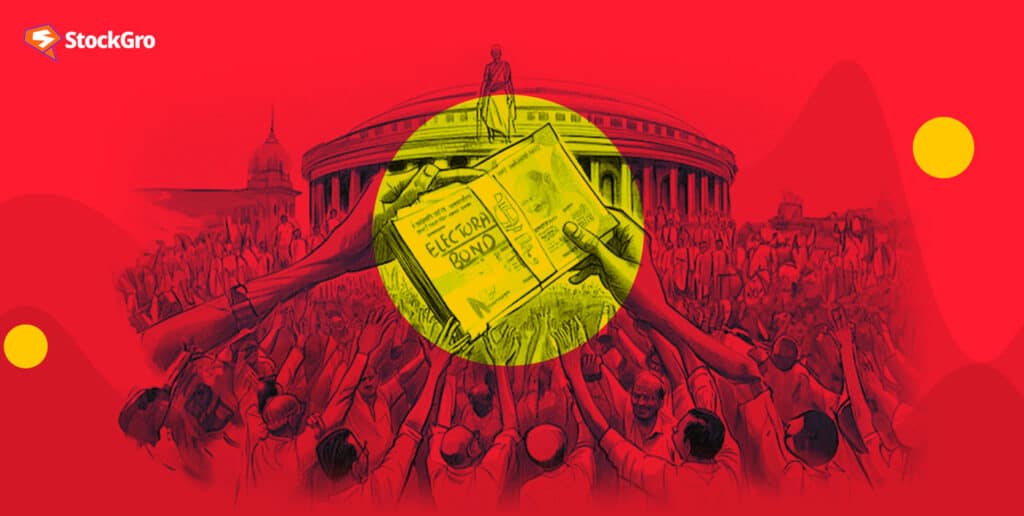
On the 15th of February 2024, a historic judgement was passed by the Supreme Court. The electoral bond scheme was declared unconstitutional and hence nullified. The court also cited its infringement on the right to information and the potential for reciprocal arrangements.
The court has ordered the State Bank of India (SBI) to reveal exhaustive information about electoral bonds. This includes the identities of donors and their connections to political parties in anticipation of the forthcoming national election.
This directive effectively dismantles a seven-year-old funding mechanism that permitted unlimited, anonymous contributions to political entities in India.
But what are these electoral bonds, and why did the Supreme Court nullify them? Let’s find out.
What is an electoral bond?
Various sectors, ranging from lottery companies to infrastructure and pharmaceutical firms, have actively participated in the electoral bond scheme.
But what is an electoral bond?
Electoral bonds in India are special financial tools that allow individuals and companies to donate money to political parties. These bonds do not earn any interest and can be bought from authorised branches of the State Bank of India.
The electoral bonds were introduced in 2018 through a change in the Finance Bill passed in 2017. Electoral bonds come in different values, ranging from ₹1,000 to ₹1 crore.
But, how to buy electoral bonds?
To purchase these bonds, you must have a proper identity verification process completed for your account (KYC-compliant account). However, the parties must deposit or encash the bonds within a specific period set by the rules.
The bond does not contain the donor’s name or any other details, thereby ensuring the anonymity of these electoral bonds. Plus, there is no restriction on the quantity of electoral bonds that can be purchased by an individual or a corporation.
Previously, regulations demanded that political groups disclose donations exceeding ₹20,000. Companies faced restrictions, prohibiting contributions beyond 7.5% of profits or 10% of revenues annually. These requirements no longer apply under the electoral bond system implemented.
Reports indicate as of January 2024, individuals and companies purchased electoral bonds totalling 165.18 billion rupees ($2 billion).
Also read: Corporate bond – definition and how they’re bought and sold
How do electoral bonds work?
When a person or company buys an electoral bond, the money from the bond purchase gets transferred into the account within a 15-day window. The political party must use that money within those 15 days, or else it goes to the Prime Minister’s Relief Fund instead.
However, you cannot buy these bonds all year round. You can only get them for 10 days at the start of each new quarter (January, April, July, and October). Additionally, they are available for an extra 30 days in Lok Sabha election years.
Now, when it comes to electoral bonds tax deductions, donations made through these bonds would be tax-deductible. This means that the donor can claim a 100% tax deduction, and the recipient’s political party can avail of tax exemption, provided they file the necessary returns.
Must read: Government bonds in India – Meaning, types and features
Why has the Supreme Court banned electoral bonds?
While the government promoted electoral bonds as a means to increase transparency in political funding, critics have raised several concerns:
1. Infringement of the Right to Information:
Critics argue that the electoral bond scheme infringes upon citizens’ fundamental right to information, particularly concerning details related to political parties.
2. Potential for shell companies:
The government’s removal of the 7.5% annual profit limit for company donations to political parties and the allowance for Indian subsidiaries of foreign companies to make donations has raised concerns about the potential use of shell companies for donations.
3. Lack of complete anonymity:
Critics argue that electoral bonds are not entirely anonymous and opaque, as the government can still determine who contributed to whom.
4. Potential misuse of funds:
Critics argue that the term “Electoral Bond” is misleading, as the funds can be used for any purpose once withdrawn, with no accountability for how parties spend the money.
5. Disparity between corporations and citizens:
The scheme provides anonymity for corporate donors, but citizens donating ₹2000 in cash must disclose their names. Critics argue this could lead to corporations overshadowing citizens’ voices in a democracy.
6. Unfairness to shareholders:
Further, experts also argue that by donating to electoral bonds, companies fail to inform shareholders how their money is being spent, which is unfair to those investing in the company. This is seen as a violation of the company’s obligation to operate within the framework.
How will political funding now work in India?
Parties still can gather funds directly from people and companies, with limits on amount and anonymity.
Donors can contribute to parties through entities named ‘Electoral Trusts’ too. These bodies collect funds and distribute them. The trusts must name donors, and parties must state the total received from such trusts, but disclosures do not directly link each donor to a party.
Also read: What are tax free bonds and how can they help you save?
Bottomline
The Supreme Court’s verdict to invalidate the electoral bond issue signifies a significant transformation in the domain of political financing in India.
The court’s ruling, citing the scheme’s unconstitutionality and its infringement on the right to information, effectively dismantles a seven-year-old mechanism that allowed for unlimited, anonymous contributions to political entities. This landmark decision is a step towards ensuring a more equitable and democratic political funding system in India.
